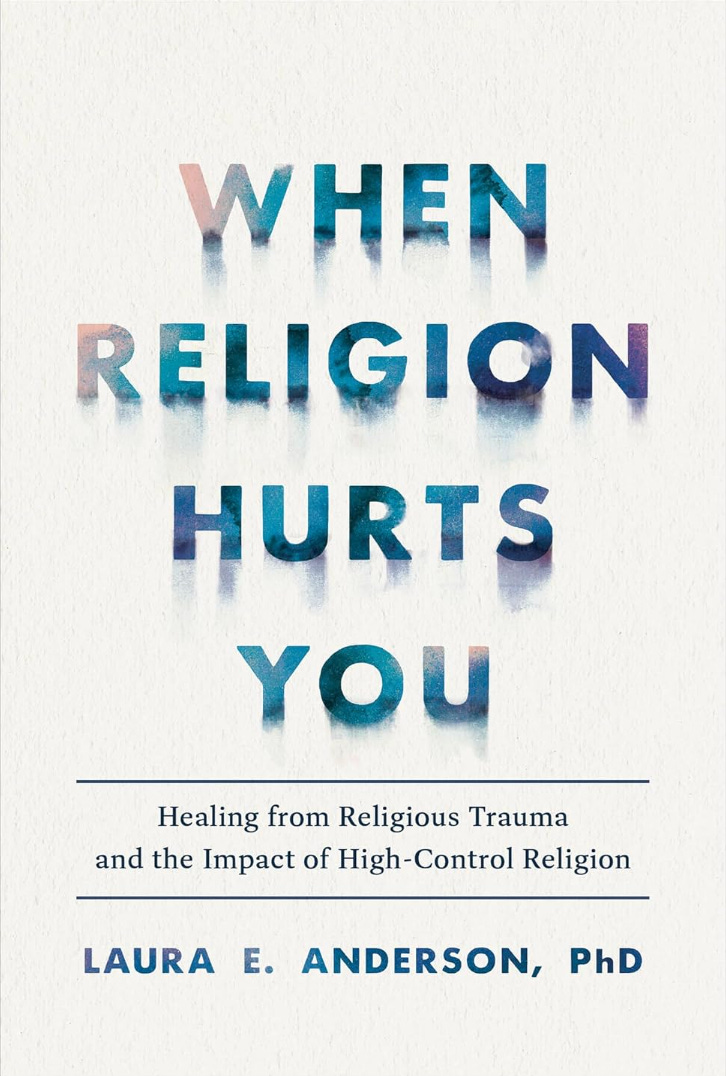
Warning: this topic can be traumatizing and re-traumatizing. I will be guarding the Comments today more carefully than normal because of the sensitivity of this topic. And, because I’m not a therapist, a psychologist, or a specialist in the field of trauma, I will be guarding the Comments vigilantly. Be kind. Be sensitive. Be respectful. Don’t go where you are not welcome. If you make a comment about a traumatic experience, please begin with TRIGGER WARNING.
Defining religious or spiritual abuse has become both important and contested.
It would not take long to find dozens of websites opposed to anything like spiritual abuse, while you can find just as many who are expressing the importance and experience of spiritual abuse. Which is why we need to read books like Laura Anderson's, When Religion Hurts You: Healing from Religious Trauma and the Impact of High-Control Religion. Her concern is HCRs (high control religions), realizing the trauma one experienced in them, leaving HCRs, and healing from the trauma and the rupture of relations that leaving entails. That last sentence, I realize, can be wounding for many who read it slowly.
To heal from religious trauma, particularly when one was reared in high control religions, entails grief. A major problem is that HCR's do not like grief, and fear a lack of control occurs when a person succumbs to grief. Anderson has an extraordinary few lines about something she calls “spiritual bypassing.” Which is, “Spiritual bypassing is a tool used to sidestep complicated emotions, psychological issues, and unfinished developmental tasks.” She continues, “Many HCR's instill in their followers of fear that if they grieve for too long, even after a loved one has died, their emotions will take over. Instead, HCR's offer platitudes to get people to look on the bright side so that others around them can avoid feeling their own discomfort with grief and loss. Focus is instead placed on seeing what people can learn through the experience or what God might be teaching them. Rather than dealing with difficult emotions or painful experiences, many are taught to instead look for how God can use the situation to bring glory to his name.”
Spiritual bypassing also explains the inability, or perhaps even the unwillingness, genuinely to enter into a period of lament and sitting in it, rather than finding release points, positive possibilities, and hope. The Book of Lamentations Simply does not take us to where many in the spiritual bypassing mode want to go.
So I want to segue from Anderson's book to 2 Jacob L. Wright, Why the Bible Began, and to his chapter about Lamentations, which he calls Daughter Zion. I riff now on that chapter.
To lament refers to a past of violence, a present moment of suffering and even torment, and a future that does not have certain answers (138). “Loss is the lens through which biblical scribes contemplate the past.” Normal national stories are stories of low odds and surprising victories and triumphs. The essence of the Old Testament story is a story of defeat and loss and grief. It is the unflinching narration of defeat and exile, with the occasional story also of return and hope. In the middle of facing exile and time in exile one discovers lament.
The Book of Lamentations, then, “is both survivors’ literature and survival literature.” The story we tell about the past and the story that gives meaning to the present and hope for the future. “Trauma makes one mute and numb, and recovery is not feasible without the victim finding his/her/their voice and naming his/her/their suffering.” Lament in the book of lamentations avoids mentioning God while inveighing against God. “They do not wait for Yhwh to speak; rather, they expect him to listen.”
Since God is sovereign they turned to God and ask Why? and How? Lament and grief then assume “the vantage point of the vanquished.”
“Like beauty, victory is in the eye of the beholder, and the definition of defeat depends on one's perspective.” The Bible is held together by narratives of loss and defeat. Wright is right: “Indeed, without the courage to look defeat in the face, to lament, to protest, and to write, all would have been lost.” The therapist helps the grieving enter into their grief, and in that grief come to terms with their own reality and begin the process of healing.
It is a fundamental mistake then to minimize lament and grief. Healing does not occur by spinning a narrative of victory, of triumph, and of hope. Healing occurs by facing reality and in the reality learning the language of healing and hope. It is too easy to call it lament, and then abort the lament by turning to stages of progress and development.
Back now to Laura Anderson's book. Grieving the life a person once had, or could have had, at times will require returning to childhood to education, to our sexuality, to our view of others in the world, and learning to grieve with the good (144).
Denial, which is a form of non grieving and non lamenting, as she writes, “is a defense mechanism that keeps us from seeing things how they truly are/were, because if we did see them for how they truly are/were, it would feel consciously intolerable.” The blindness to reality requires the removal of the blinders, and to turn toward acceptance of that reality. But “acceptance is not an end point…. [it] means leaning into the present moment and letting the truth that comes from that heal you. Acceptance happens when we allow the blinders to come off and see things with accuracy and honesty.” And, What previously held us in its grip will be experienced as something losing its power and its grip on us.
It’s almost the start of a new year. How about giving a gift subscription to this Substack to someone? Thank you.

















I'm going to remember that phrase: "spiritual bypassing." It nails the way that so many handle trauma of all kinds.
"Her concern is HCRs (high control religions), realizing the trauma one experienced in them, leaving HCRs, and healing from the trauma and the rupture of relations that leaving entails." This sentence points to the importance of church leaders to comprehend attachment theory. A church is either ethically wanting what Jesus teaches for people OR they want a business. It's an either or thing. Jesus teaches about relating well. You can't avoid grief/lament because we are designed to lament, unless you want to keep people coming and that makes it a business not a church.
Understanding design, in His image, it critical for understanding the process you will go through to recognize trauma from church practices. I think Laura's understanding does a fairly good job of describing. I realized a couple of important things about being human from this book and Scot's posts. One being that I had not grieved the loss. My experience of healing or transformation created a lot of attachment over 20 years. Some of those practices need to be discontinued and an unwillingness to look at the hard truth, I had to make the decision to leave. But that doesn't stop the pain of loss. It's comparable to why women stay in abusive marriages. And children grow into adults thinking their family was good, when, in fact, they were violent. We don't disconnect easily if we are at all "normal". Even to things that are not good for us.
Scot I'm impressed with your understanding the material.